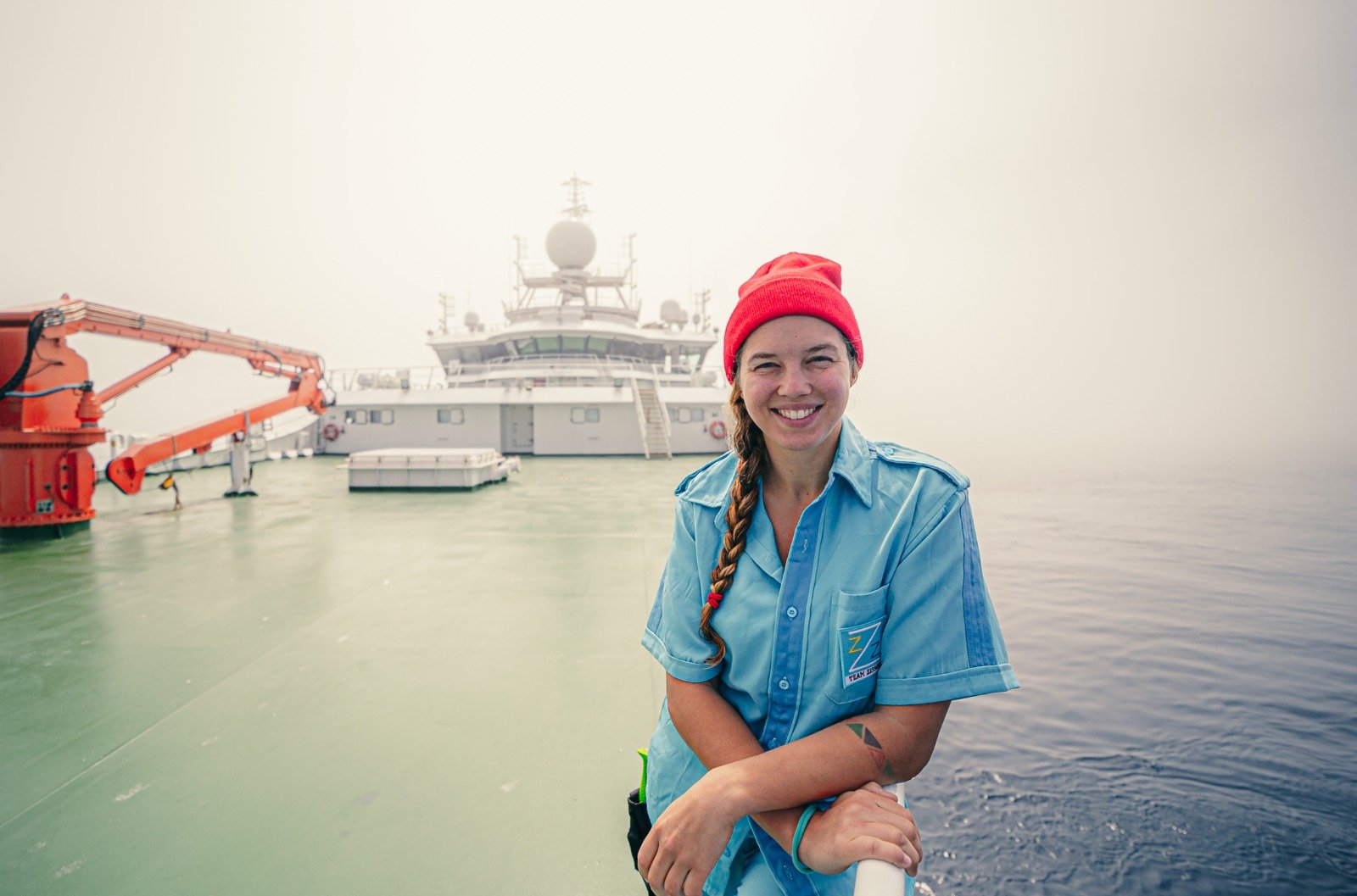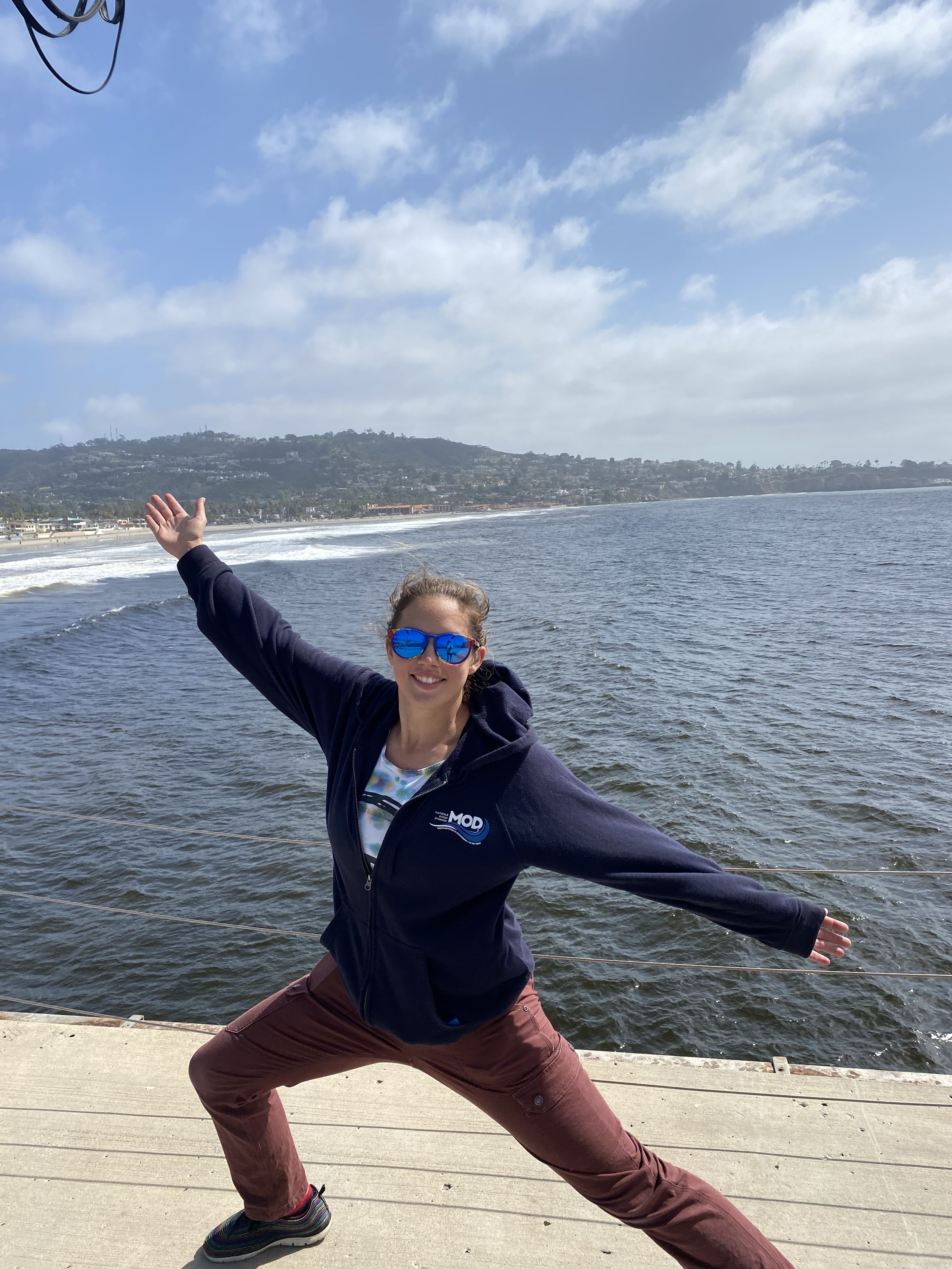What is your background and what are you working on at the moment?
I did mechanical and ocean engineering as my major at MIT. After graduating I spent a year and a half working at a friend’s tech startup in San Francisco, but I missed the “hands on” part and actually making things, plus I missed the ocean. Thus, I decided to move to San Diego. When I got here, I religiously checked the Scripp’s job listings and eventually saw an opening in MOD. I thought it sounded phenomenal, sent in my application, and now it’s been six years. I’m currently working mostly with the epsi, our in-house microstructure instrument to measure small scale turbulence in the ocean. That was my first project when I joined MOD and since then we’ve gone through several iterations and developed the deep version that can go down to 2000m. We are currently redesigning the deep version to fall faster for a project in May where it will have to combat stronger currents to get down to the depth we are most interested in measuring. Next up I’m going to be the project lead on making the “epsi-SOLO” where we’re trying to integrate our sensors onto a SOLO float. We all do a little bit of everything as engineers, but my main focus area is the mechanical stuff.
What keeps you excited and interested in working in the field of oceanography?
Everything! I really love the fieldwork aspect of the job – it is great getting to be out there on the water and measure things instead of just making instruments and sending them off to be used by someone else. Getting to see it work and go through the whole process, testing, improving etcetera, is really cool. Also, I honestly don’t know why we’re bothering with space, there is so much to learn about the ocean and our planet in general. It really feels like you’re at the frontier of human exploration. Even when I don’t understand all the science bits, I love the feeling of learning things and advancing our understanding of the ocean.
Last but not least I’d have to say that the people I get to work with also keep me excited about my job. I’m surrounded by amazing humans that are the perfect blend of supersmart, quirky, caring, and interesting and it really makes all the difference to have fun people around you.
When you were a kid, did you expect to be an engineer?
No, not really, I thought I was going to do architecture. As a kid I didn’t even know that oceanography was a thing and I thought that if you’re into designing, building things, sustainability and all that, you should go into green architecture. I still think that could have been fun, but it’s a different timeline. Things take much longer in architecture. I like being able to tinker with something, make a prototype and throw it in the ocean to test it almost right away. Designing buildings involves years of planning and it might not even get built at all.
Were there any particular things from your childhood that drew you to study the ocean and make gadgets?
I’ve always been one to tinker with things and keep my hands busy, from origami to drawing and all sorts of crafts from basket weaving to wire working. I love making things of all different mediums and combining different techniques in my projects. I also loved playing with Lego growing up, and of course my collection has grown. Hence, I’m not super surprised I now make gadgets for a living.
As for me ending up working with the ocean, that’s not entirely surprising either. I grew up near the ocean in New Jersey, we lived probably 15 minutes from the beach, and my dad was a commercial fisherman. As a kid I did a lot of surfing, snorkeling, fishing, clamming and all that. I don’t fish a whole lot anymore, but I’ve always liked being on the water and going out in our small boat (though as a kid I remember going out scalloping on a day trip with my dad and I was just puking my guts out and had a rough time).
What skills or abilities do you think are useful when thinking about getting into oceanography and becoming a member of the engineering development team?
I think it is important to not be afraid to ask questions, to be curious about trying new things and not think that you have to perfect a design before you prototype it. When I started, I would be tweaking a design a million times before I’d cut it out, say on the router table, and then I’d instantly notice everything that was wrong with it. The more time you spend just getting the prototypes out the quicker your design progresses and before you know it, you’re already on version “n” and it’s actually working, versus spending all that time on the computer and it’s looking nice but it’s not functional.
What does a typical workday look like for you?
There are days when you spend hours looking up different types of epoxies, reading various data sheets, looking into material properties and specifications, and then trying to combine everything in SolidWorks. Then there are days when you spend hours in the machine shop, making prototypes and you can instantly test your ideas. An ideal day is about 50% computer time and 50% making stuff. Lately my day also includes cleaning and organizing gear in the lab – we often have kits and instruments coming back from sea trips that needs to rejoin the lab space.
I love the "making stuff part best though. All our machines you have to learn a decent amount to use safely, thus anything you want to make also becomes sort of a puzzle of trying to figure out how to make it, how to secure the part in the machine, what tools to use etcetera. That always stays interesting to me. It’s also exciting when we get parts back from the campus machine shop and get to start assembling things like a big Lego set. I wish I could say I went surfing every morning too, but that doesn’t always happen. I do love lunch surf breaks though.
What drew you to Scripps?
I grew up on the east coast so Woods Hole [Oceanographic Institution, WHOI] was always a cool thing we had over there, it would be in the paper and on the news. I did a summer internship there between my junior and senior year of college. That project was all about physical oceanography and fieldwork, and I was mindblown that one could do that as a job. Some of the people I worked with at WHOI mentioned Scripps, and I figured I was ready for some warmer weather, so I looked into jobs here.
Is there a particular scientist/person/engineer that inspires you?
Oh, that would have to be Mike, our senior engineer, any day of the week. He has a background in electrical engineering, but he can pretty much make anything and learn anything overnight by watching YouTube videos. His ability to constantly tinker and keep a problem going in his brain, even when he’s sleeping or not working, it is pretty amazing. He’s very well rounded in his engineering skillset which is something I aspire to - not to mention his witty jokes
Do you have a fun fact that you'd like to share that not everyone knows about you?
Everybody knows I love Lego, like a lot. I’m also a big fan of turtles, but that’s perhaps also a well-established fact. Well, not everyone knows that I was president of the Origami Society at MIT. My favorite things to make are the modular builds, for example when you make a sphere, and you first make 30 small pieces and interlock them all to form a bigger piece. I prefer that over super intricate, single-sheet-of-paper projects. I once was part of a team that made 400 pieces that were put together to a big sphere that ended up in the local museum.
Written by Kerstin Bergentz




